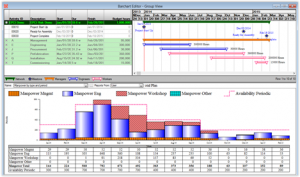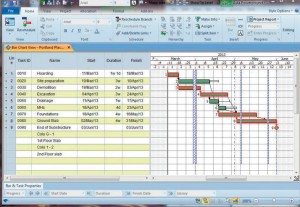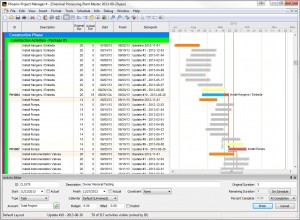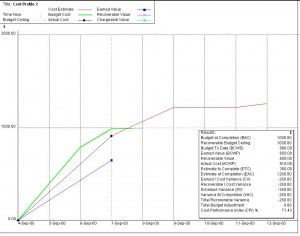Last week’s Construction CPM Conference in San Diego was a big success! It was my first time attending (and presenting at, for that matter) the Construction CPM Conference, and boy am I glad I did. This is a unique conference that attracts CPM Scheduling pioneers, veterans and academic experts. It’s a bit overwhelming if you’re new to the field of schedule, but the level of the presentations is of the some of the highest I’ve seen outside of academia. But I think my presentation on Hacking Primavera P6 Professional still managed to teach some long-time practitioners some new tricks. What do you think?
One of the other unique features of this conference is that it’s a great venue for competing software vendors to display their stuff. I’m a big fan of Collaborate – the annual users conference for Oracle software users, as I’ve been involved in organizing the call for papers for the last 2 years for the Primavera track. However, you only see Oracle at Collaborate, and at Construction CPM you get to see so much more that is going on around the world in terms of project scheduling software. It’s a great place to see how products differentiate themselves as well.
Here are 4 Up-and-Coming Project Scheduling Tools You May Not Know About (but should).
Let me preface this section by clarifying that some of these tools have been around for quite some time. The reasons I consider these tools up and coming is because their are now re-positioning themselves in the global marketplace and pitting themselves against the major player(s).
Safran Project
Got a planning tool? A risk analysis tool? Do you have separate cost management tool too? AND a separate reporting system? Well Safran Project has all this in a single desktop client.
 And that’s what I saw in the demo. This is a very sensible approach to designing a planning tool – Monte Carlo analysis built right in with reports that can be pushed to the web for easy access. Apparently the risk management side is designed by the some of original team who created Pertmaster, now Primavera Risk Management. Safran has been in the project management software game for many years and is widely used in northern Europe Oil & Gas – but they are expanding to new markets.
And that’s what I saw in the demo. This is a very sensible approach to designing a planning tool – Monte Carlo analysis built right in with reports that can be pushed to the web for easy access. Apparently the risk management side is designed by the some of original team who created Pertmaster, now Primavera Risk Management. Safran has been in the project management software game for many years and is widely used in northern Europe Oil & Gas – but they are expanding to new markets.
Safran planning tool comes in 2 flavors – enterprise or standalone for individual or smaller company. The tool’s interface has been recently re-skinned with tabbed ribbon-bars to match the look and feel of Excel or Word. With a full CPM scheduling engine under the hood, and some ease-of-use features like schedule comparison, enhanced what-if analysis and change control, Safran Project has all of the makings of a heavy-weight contender. Priced similarly to Primavera P6 Professional, anyone doing a feature-to-feature comparison would see that Safran offer more features for the pricetag. Safran’s website even offers a Primavera P6 replacement program. Safran Project is a definite up-and-comer to watch.
Website: www.safran.com
Asta PowerProject
 Asta PowerProject is another tool that is not new and many users in Europe are big fans. We recently invited long-time Asta user Mike Testro to guest-host a members-only webinar and Mike showcased some of the ease of use of Asta.
Asta PowerProject is another tool that is not new and many users in Europe are big fans. We recently invited long-time Asta user Mike Testro to guest-host a members-only webinar and Mike showcased some of the ease of use of Asta.
Like Safran, Asta sports a full-blown CPM scheduling engine with power to handle resource, costs, earned value, reporting and more. Like Safran and P6, Asta Enterprise is also an enterprise project management tool with a database at the back-end. My feel is that one of Asta’s focal points on ease-of-use. In some cases, it works just like a spreadsheet, being able to copy data across cells AND from Excel itself. It imports MSP and P6 files as well.
Asta PowerProject integrates with other Asta products, notably Asta BIM – an impressive visualization tool that maps schematics to schedule. It’s not surprising to see these products tighly integrated as BIM (or Building Information Modeling) is fast becoming a must-have for many governments and companies alike. But the real benefit here is the pricetag – Asta PowerProject is priced about half the cost of a P6 licence. And Asta’s BIM tool is similarly competitively priced. With a mobile app in the works as well, these factors make Asta PowerProject an attractive tool to any company searching for a scheduling platform.
Website: www.astadev.com
Phoenix Project Manager
Although I didn’t get a chance to play with Phoenix Project Manager at the Construction CPM conference, the Phoenix team were certainly out in force and sponsored many events. (Thanks!)
 After doing some research on the tool via YouTube.com and the Phoenix website, the offering here is a solid one. Phoenix Project Manager looks a lot like Primavera P6 Professional, but I do note some key differences. The Phoenix Gantt Charts handles drawing relationships lines very well – it’s look much more refined here than P6. I also note some unique features like the Flag activity type, and the ability to store versions of your schedule to track revisions and history. Phoenix boasts a solid CPM scheduling engine under the hood and seems to do mostly what P6 does.
After doing some research on the tool via YouTube.com and the Phoenix website, the offering here is a solid one. Phoenix Project Manager looks a lot like Primavera P6 Professional, but I do note some key differences. The Phoenix Gantt Charts handles drawing relationships lines very well – it’s look much more refined here than P6. I also note some unique features like the Flag activity type, and the ability to store versions of your schedule to track revisions and history. Phoenix boasts a solid CPM scheduling engine under the hood and seems to do mostly what P6 does.
The difference? Well the product runs on Macs (OS X) which is nice for those are embedded in Apple gear. But price is a major factor here as well. Phoenix is priced at $799 per license, much less than a license of P6. Not only that, there is an academic license allowing students to use it free of charge. Nice! Download a trial if we’ve peeked your curiosity.
Website: www.phoenixcpm.com
BONUS Tool: Micro Planning X-Pert
I thought it was very appropriate to include Micro Planning X-Pert in this list. For those who are true aficionados of CPM scheduling, this is the tool for you. I got to sit in on a presentation of this tool and I was impressed.
 X-Pert is a standalone planning tool that aims to be as true to CPM and scheduling best practices as possible. I learned that due to its enhanced handling of calendars, calendar-creep is an impossibility – (sidebar: it is possible to muck with calendars in P6 such you can create activities that say, are 365d in duration but show up as 1.27 years – this called calendar-creep). X-Pert also does some unique things on the resourcing side, with a construct called a resource pool that effectively manages your demand peaks and deficit valleys (demo required to really see this in action). Suffice it to say, I was impressed by much of what I saw. And it turns out X-Pert has been used on some large projects in the defence vertical.
X-Pert is a standalone planning tool that aims to be as true to CPM and scheduling best practices as possible. I learned that due to its enhanced handling of calendars, calendar-creep is an impossibility – (sidebar: it is possible to muck with calendars in P6 such you can create activities that say, are 365d in duration but show up as 1.27 years – this called calendar-creep). X-Pert also does some unique things on the resourcing side, with a construct called a resource pool that effectively manages your demand peaks and deficit valleys (demo required to really see this in action). Suffice it to say, I was impressed by much of what I saw. And it turns out X-Pert has been used on some large projects in the defence vertical.
Now the MPI guys are trying to upgrade the codebase of X-Pert as it is currently stuck on a 16-bit codebase. Regardless, X-Pert does run on  Windows 8.1 Pro (32.bit). And there is a straightforward workaround to run it in a VirtualBox. Visit their site for all of the details.
Windows 8.1 Pro (32.bit). And there is a straightforward workaround to run it in a VirtualBox. Visit their site for all of the details.
For the standalone user who is looking for a tool that can handle the very complex at a reasonable price, X-Pert is one tool you’ll want to consider in your top 5.
Website: www.microplanning.com.au
Have you used any of these tools? Share your experiences with us – leave us a comment and let us know what you like or don’t like.

